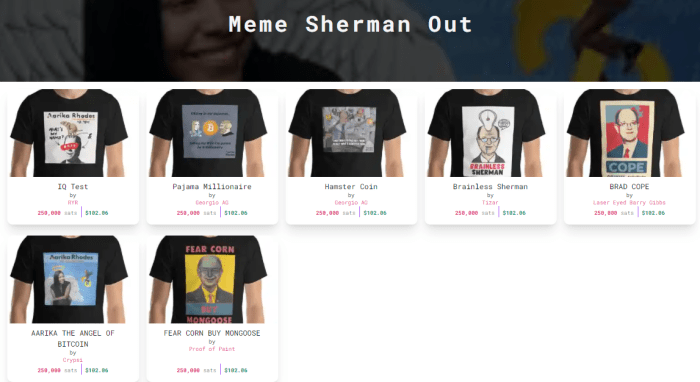Bitcoin Art Collection Support Aarika Rhodes
Bitcoin-related artwork marketplace Scarce City has launched a collection of BTC tokenized T-shirts to support Aarika Rhodes’ congressional campaign against Brad Sherman, a vocal critic of Bitcoin, according to a press release shared with Bitcoin Magazine.
“Brad Sherman is Bitcoin’s worst villain and he has significant power as a senior member of the Financial Services Committee,” said Scarce City’s chief executive pleb, Chris Tramount, in a statement. “Replacing him with Bitcoin-proponent Aarika Rhodes would directly enable Bitcoin-friendly legislation and communicate the influence of the Bitcoin community to politicians around the world.”
The collection is composed of pro-Rhodes and anti-Sherman designs by Bitcoin artists and meme makers to be sold as T-shirts and Bitcoin NFTs through the Counterparty protocol. When a sale is made of any item in the collection, $25 worth of bitcoin according to the exchange rate at the time of transaction will be donated to Rhodes’ campaign to become the congresswoman of California’s district CA-32.
Scarce City leverages Bitcoin technologies to support Bitcoin culture and adoption by enabling Bitcoin creators to shape the future. The integration of Lightning, Bitcoin’s layer-2 protocol for faster and cheaper payments, decreases auction costs and improves efficiency in its marketplace, where Bitcoin art is auctioned and priced in BTC. Buyers bid online, and the art is delivered as soon as a winner is selected.
“The company debuted its first auction for Chiefmonkey’s ‘Relentless Optimism’ in December 2020 and has since run nearly 300 auctions and facilitated over one thousand Rare Pepe marketplace transactions,” per the release. “The platform uses low-fee, instant bitcoin transactions made possible by the Lightning Network to under-collateralize auction bids and marketplace listings to keep participants accountable.”
According to the release, the “Meme Sherman Out” collection in support of Rhodes’ campaign is Scarce City’s first major push to expand their fixed-price marketplace into physical merchandise.

